外研社必修五module3参考教案
外研社必修五module3-参考教案
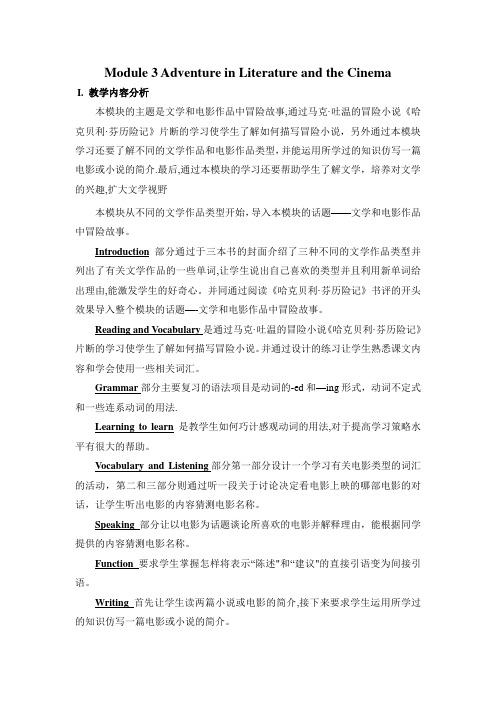
Module 3 Adventure in Literature and the CinemaI. 教学内容分析本模块的主题是文学和电影作品中冒险故事,通过马克·吐温的冒险小说《哈克贝利·芬历险记》片断的学习使学生了解如何描写冒险小说,另外通过本模块学习还要了解不同的文学作品和电影作品类型,并能运用所学过的知识仿写一篇电影或小说的简介.最后,通过本模块的学习还要帮助学生了解文学,培养对文学的兴趣,扩大文学视野本模块从不同的文学作品类型开始,导入本模块的话题——文学和电影作品中冒险故事。
Introduction 部分通过于三本书的封面介绍了三种不同的文学作品类型并列出了有关文学作品的一些单词,让学生说出自己喜欢的类型并且利用新单词给出理由,能激发学生的好奇心。
并同通过阅读《哈克贝利·芬历险记》书评的开头效果导入整个模块的话题—-文学和电影作品中冒险故事。
Reading and Vocabulary是通过马克·吐温的冒险小说《哈克贝利·芬历险记》片断的学习使学生了解如何描写冒险小说。
并通过设计的练习让学生熟悉课文内容和学会使用一些相关词汇。
Grammar部分主要复习的语法项目是动词的-ed和—ing形式,动词不定式和一些连系动词的用法.Learning to learn是教学生如何巧计感观动词的用法,对于提高学习策略水平有很大的帮助。
Vocabulary and Listening部分第一部分设计一个学习有关电影类型的词汇的活动,第二和三部分则通过听一段关于讨论决定看电影上映的哪部电影的对话,让学生听出电影的内容猜测电影名称。
Speaking部分让以电影为话题谈论所喜欢的电影并解释理由,能根据同学提供的内容猜测电影名称。
Function要求学生掌握怎样将表示“陈述"和“建议"的直接引语变为间接引语。
Writing首先让学生读两篇小说或电影的简介,接下来要求学生运用所学过的知识仿写一篇电影或小说的简介。
高二英语外研版 必修5 Module 教案
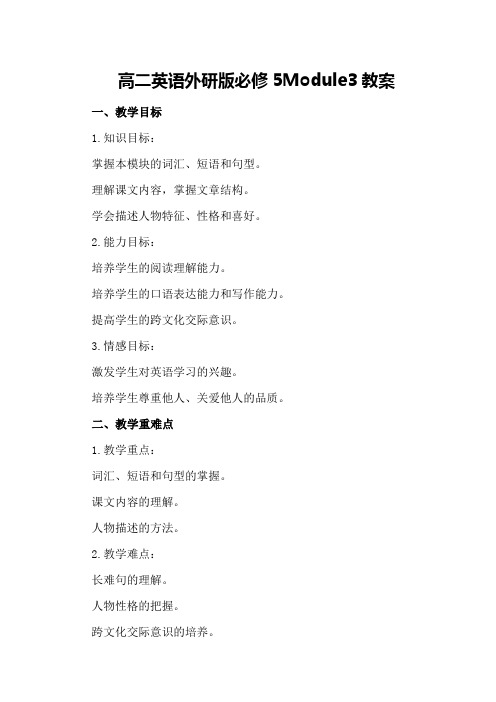
高二英语外研版必修5Module3教案一、教学目标1.知识目标:掌握本模块的词汇、短语和句型。
理解课文内容,掌握文章结构。
学会描述人物特征、性格和喜好。
2.能力目标:培养学生的阅读理解能力。
培养学生的口语表达能力和写作能力。
提高学生的跨文化交际意识。
3.情感目标:激发学生对英语学习的兴趣。
培养学生尊重他人、关爱他人的品质。
二、教学重难点1.教学重点:词汇、短语和句型的掌握。
课文内容的理解。
人物描述的方法。
2.教学难点:长难句的理解。
人物性格的把握。
跨文化交际意识的培养。
三、教学过程1.导入利用图片、视频或故事导入本模块的主题。
提问:你们对这个人有什么印象?他的性格特点是什么?2.词汇教学利用图片、实物或情境教授新词汇。
设计一些练习,让学生在语境中运用新词汇。
3.阅读教学让学生快速阅读课文,了解文章大意。
分析课文结构,找出文章的主题句。
对课文中的长难句进行讲解,帮助学生理解。
设计问题,让学生回答,检查他们对课文的理解。
4.口语教学设计一些角色扮演、讨论或采访活动,让学生在语境中运用所学知识。
教师示范,引导学生模仿。
5.写作教学提供一些写作素材,让学生进行写作练习。
分析优秀范文,让学生了解写作技巧。
批改学生作文,给出修改意见。
6.语法教学分析课文中的语法现象,让学生了解语法规则。
设计一些练习,让学生在语境中运用语法知识。
7.跨文化交际教学分析课文中的跨文化交际现象,让学生了解不同文化背景下的交际方式。
设计一些实践活动,让学生在模拟情境中运用跨文化交际知识。
8.课堂小结对学生的表现给予肯定和鼓励。
四、作业布置1.复习本节课的词汇、短语和句型。
2.完成课文后的练习。
3.准备下一次课的口语活动。
五、教学反思本节课通过多种教学活动,让学生在语境中学习英语,提高了他们的阅读理解能力、口语表达能力和写作能力。
但在教学过程中,仍有一些不足之处,如:1.部分学生对长难句的理解仍有困难,需要加强语法教学。
2.部分学生的口语表达能力较弱,需要加强口语练习。
外研版高中英语必修5教案Module 3 Grammar
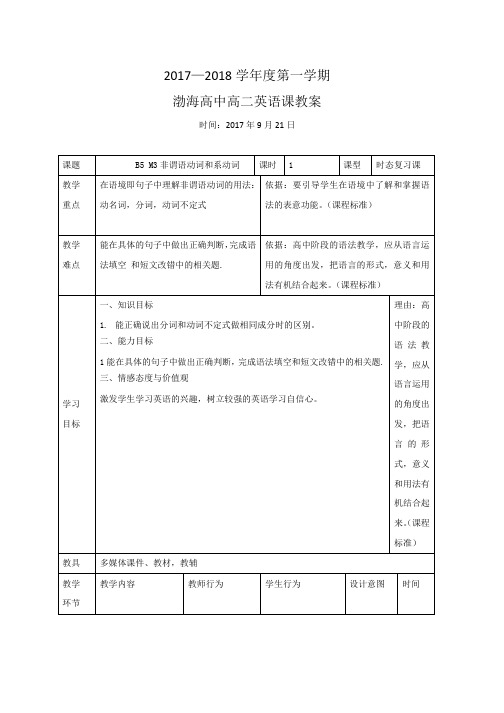
学习
目标
一、知识目标
1.能正确说出分词和动词不定式做相同成分时的区别。
二、能力目标
1能在具体的句子中做出正确判断,完成语法填空和短文改错中的相关题.
三、情感态度与价值观
激发学生学习英语的兴趣,树立较强的英语学习自信心。
检测学生自主学习情况,发现问题,解决问题。
10分钟
3.
做议讲评
1跟进巩固提升训练习题
1教师布置巩固提升习题,填空和改错
1全体学生独立完成巩固提升习题,小组讨论,小组展示,讨论,达成共识
进一步巩固训练,完成能力目标1,
15分钟
4.
总结提升
总结本课学习内容
教师鼓励学生总结本课内容,必要时补充
学生总结本课所学的知识点,包括现在完成时的基本用法,标志性时间状语,固定句型。
1或锻炼学生解读当堂学习目标2学生抢答教师提出的问题,回答正确可为小组加分。
调动学生自主预习英语的积极性,检测学生自主学习情况,完成知识目标1, ,
3分钟
2.
承接结果
核对自主学习任务中布置的习题答案。
教师监控学生展示讨论过程,必要时查缺补漏,适时补充。
一名学生展示自主作业习题,其他学生核对答案,提出质疑,讨论,最后达成共识。
2017—2018学年度第一学期
渤海高中高二英语课教案
时间:2017年9月21日
课题
B5 M3非谓语动词和系动词
课时
1
课型
时态复习课
教学
重点
在语境即句子中理解非谓语动词的用法:动名词,分词,动词不定式
依据:要引导学生在语境中了解和掌握语法的表意功能。(课程标准)
外研社必修五module3_参考教案-推荐下载
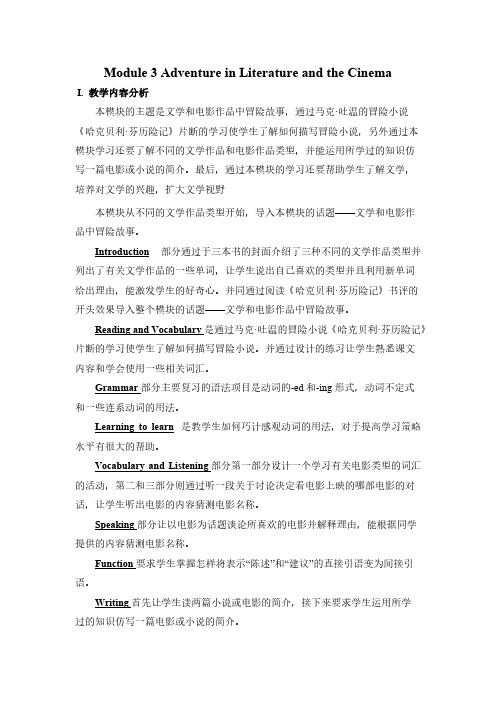
Module 3 Adventure in Literature and the CinemaI. 教学内容分析本模块的主题是文学和电影作品中冒险故事,通过马克·吐温的冒险小说《哈克贝利·芬历险记》片断的学习使学生了解如何描写冒险小说,另外通过本模块学习还要了解不同的文学作品和电影作品类型,并能运用所学过的知识仿写一篇电影或小说的简介。
最后,通过本模块的学习还要帮助学生了解文学,培养对文学的兴趣,扩大文学视野本模块从不同的文学作品类型开始,导入本模块的话题——文学和电影作品中冒险故事。
Introduction 部分通过于三本书的封面介绍了三种不同的文学作品类型并列出了有关文学作品的一些单词,让学生说出自己喜欢的类型并且利用新单词给出理由,能激发学生的好奇心。
并同通过阅读《哈克贝利·芬历险记》书评的开头效果导入整个模块的话题——文学和电影作品中冒险故事。
Reading and Vocabulary是通过马克·吐温的冒险小说《哈克贝利·芬历险记》片断的学习使学生了解如何描写冒险小说。
并通过设计的练习让学生熟悉课文内容和学会使用一些相关词汇。
Grammar部分主要复习的语法项目是动词的-ed和-ing形式,动词不定式和一些连系动词的用法。
Learning to learn是教学生如何巧计感观动词的用法,对于提高学习策略水平有很大的帮助。
Vocabulary and Listening部分第一部分设计一个学习有关电影类型的词汇的活动,第二和三部分则通过听一段关于讨论决定看电影上映的哪部电影的对话,让学生听出电影的内容猜测电影名称。
Speaking部分让以电影为话题谈论所喜欢的电影并解释理由,能根据同学提供的内容猜测电影名称。
Function要求学生掌握怎样将表示“陈述”和“建议”的直接引语变为间接引语。
Writing首先让学生读两篇小说或电影的简介,接下来要求学生运用所学过的知识仿写一篇电影或小说的简介。
外研版高中英语必修5教案Module 3 readingI

进一步巩固训练,完成能力目标1,2
15分钟
4.
总
结
提升
总结本课学习内容
教师鼓励学生总结本课内容,必要时补充
学生总结本课所学的知识点,包括文章重点词汇,短语,句型。
培养学生总结当堂课内容的能力
4分钟
5.
目标
检测
完成当堂检测习题
教师分发当堂检测题
学生动笔完成当堂检测习题
检测本课学习目标的达成情况
激发学生学习英语的兴趣,树立较强的英语学习自信心。
理由
高中阶段的阅读训练,应从语言运用的角度出发,把语言的形式,意义和用法有机结合起来。(课程标准)
教具
多媒体课件、教材,教辅
教学
环节
教学内容
教师行为
学生行为
设计意图
时间
1.课前3分钟1.阅Βιβλιοθήκη 理解的基本步骤2.重点单词短语
1.教师解读当堂学习目标2.教师依据布置的课前自主学习任务提问,检测学生自主学习情况
It had hit a rock and was half in and half out of the water.
I’ve had enough of you. I’m going to shoot you now .
2.能力目标
1能理解文章的主旨大意
2,掌握作者的观点态度
3.情感态度与价值观
2.运用语言点完成文章填空
依据:高中阶段阅读教学,从提高阅读理解的能力出发,培养学生的理解思维模式,与阅读试题结合(考纲标准)
学习
目标
1.知识目标
1.能准确翻译课文中重点词汇,短语的汉义
单词:biography fantasy detective
外研版必修5 Module3教案
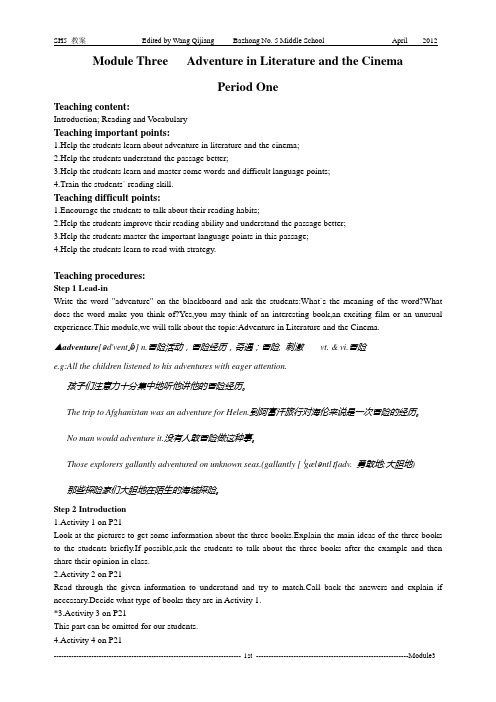
Module Three Adventure in Literature and the CinemaPeriod OneTeaching content:Introduction; Reading and V ocabularyTeaching important points:1.Help the students learn about adventure in literature and the cinema;2.Help the students understand the passage better;3.Help the students learn and master some words and difficult language points;4.Train the students` reading skill.Teaching difficult points:1.Encourage the students to talk about their reading habits;2.Help the students improve their reading ability and understand the passage better;3.Help the students master the important language points in this passage;4.Help the students learn to read with strategy.Teaching procedures:Step 1 Lead-inWrite the word "adventure" on the blackboard and ask the students:What`s the meaning of the word?What does the word make you think of?Yes,you may think of an interesting book,an exciting film or an unusual experience.This module,we will talk about the topic:Adventure in Literature and the Cinema.▲adventure[əd'ventʃə] n.冒险活动,冒险经历,奇遇;冒险, 刺激vt. & vi.冒险e.g:All the children listened to his adventures with eager attention.孩子们注意力十分集中地听他讲他的冒险经历。
高中英语外研版必修5【教学设计】Module 3
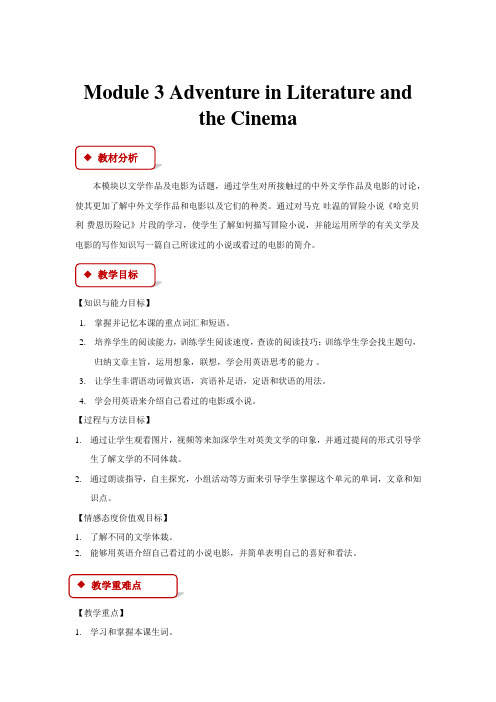
Module 3 Adventure in Literature andthe Cinema本模块以文学作品及电影为话题,通过学生对所接触过的中外文学作品及电影的讨论,使其更加了解中外文学作品和电影以及它们的种类。
通过对马克·吐温的冒险小说《哈克贝利·费恩历险记》片段的学习,使学生了解如何描写冒险小说,并能运用所学的有关文学及电影的写作知识写一篇自己所读过的小说或看过的电影的简介。
1.掌握并记忆本课的重点词汇和短语。
2.培养学生的阅读能力,训练学生阅读速度,查读的阅读技巧;训练学生学会找主题句,归纳文章主旨,运用想象,联想,学会用英语思考的能力。
3.让学生非谓语动词做宾语,宾语补足语,定语和状语的用法。
4.学会用英语来介绍自己看过的电影或小说。
【过程与方法目标】1.通过让学生观看图片,视频等来加深学生对英美文学的印象,并通过提问的形式引导学生了解文学的不同体裁。
2.通过朗读指导,自主探究,小组活动等方面来引导学生掌握这个单元的单词,文章和知识点。
【情感态度价值观目标】1.了解不同的文学体裁。
2.能够用英语介绍自己看过的小说电影,并简单表明自己的喜好和看法。
【教学重点】1.学习和掌握本课生词。
2.让学生掌握非谓语动词做宾语,宾语补足语,定语和状语的用法。
【教学难点】1.多层次的训练阅读能力,提高阅读水平2.怎样让学生灵活使用词汇、短语和句型来做题。
PPT、录音机等Step 1 Introduction1. Lead-inT: As I know, most of you have a good habit of reading books in your spare time. Who would like to tell me your favorite books? And why do you like them?S: My favorite book is The Dream of The Red Mansion. It introduces us not only a love story but also people’s life of Qing Dynasty. We can know more about Qing Dynasty by reading it. The book is also one of the most famous Chinese novels.S: I like reading Harry Potter and the Half-Blood Prince very much, which is written by J. K. Rowling. It is a book full of magic. At the same time, the book tells us justice can defeat vicious force no matter what happens. And Harry Potter is one of the most popular books all over the world.2. Warming upT: Very good! Then I have a question: How many different types of books do you know?Ss: Autobiography, crime...T: Please open your books and turn to page 21. Look at the words in the box which all describe the types of books. Please match them with their meanings.A few minutes later, check the answers.3. Pair-work: which book would you like to read and why? (Activity 1, P21)1). The teacher shows three short passages about the three books in activity 1Wolves of the Calla: The remote town, Calla, is best known for twins. Unfortunately, every ten years, some bad guys dressing up as wolves come to take away a child from each pair of the。
外研版高中英语必修五Module3Literature教案Period 5

四、so, neither, nor作部分倒装
表示"也"、"也不"的句子要部分倒装。
五、only在句首要倒装的情况
强调句
基本句型I:It is (was)+被强调成分+that (who, whom)+其余成分
I am going to Beijing to attend a meeting tomorrow morning by air.
二、倒装句之部分倒装
部分倒装是指将谓语的一部分如助动词或情态倒装至主语之前。如果句中的谓语没有助动词或情态动词,则需添加助动词do, does或did,并将其置于主语之前。
1)句首为否定或半否定的词语,如no, not, never, seldom, little, hardly, at no time, in no way, not until…等。
No sooner had she gone out than a student came to visit her.
四、so, neither, nor作部分倒装
表示"也"、"也不"的句子要部分倒装。
Tom can speak French. So can Jack.
If you won’t go, neither will I.
It is Beijing that I am going to attend a meeting tomorrow morning by air.
It is a meeting that I am going to Beijing to attend tomorrow morning by air.
- 1、下载文档前请自行甄别文档内容的完整性,平台不提供额外的编辑、内容补充、找答案等附加服务。
- 2、"仅部分预览"的文档,不可在线预览部分如存在完整性等问题,可反馈申请退款(可完整预览的文档不适用该条件!)。
- 3、如文档侵犯您的权益,请联系客服反馈,我们会尽快为您处理(人工客服工作时间:9:00-18:30)。
Module 3 Adventure in Literature and the CinemaI. 教学内容分析本模块的主题是文学和电影作品中冒险故事,通过马克·吐温的冒险小说《哈克贝利·芬历险记》片断的学习使学生了解如何描写冒险小说,另外通过本模块学习还要了解不同的文学作品和电影作品类型,并能运用所学过的知识仿写一篇电影或小说的简介。
最后,通过本模块的学习还要帮助学生了解文学,培养对文学的兴趣,扩大文学视野本模块从不同的文学作品类型开始,导入本模块的话题——文学和电影作品中冒险故事。
Introduction 部分通过于三本书的封面介绍了三种不同的文学作品类型并列出了有关文学作品的一些单词,让学生说出自己喜欢的类型并且利用新单词给出理由,能激发学生的好奇心。
并同通过阅读《哈克贝利·芬历险记》书评的开头效果导入整个模块的话题——文学和电影作品中冒险故事。
Reading and Vocabulary是通过马克·吐温的冒险小说《哈克贝利·芬历险记》片断的学习使学生了解如何描写冒险小说。
并通过设计的练习让学生熟悉课文内容和学会使用一些相关词汇。
Grammar部分主要复习的语法项目是动词的-ed和-ing形式,动词不定式和一些连系动词的用法。
Learning to learn是教学生如何巧计感观动词的用法,对于提高学习策略水平有很大的帮助。
Vocabulary and Listening部分第一部分设计一个学习有关电影类型的词汇的活动,第二和三部分则通过听一段关于讨论决定看电影上映的哪部电影的对话,让学生听出电影的内容猜测电影名称。
Speaking部分让以电影为话题谈论所喜欢的电影并解释理由,能根据同学提供的内容猜测电影名称。
Function要求学生掌握怎样将表示“陈述”和“建议”的直接引语变为间接引语。
Writing首先让学生读两篇小说或电影的简介,接下来要求学生运用所学过的知识仿写一篇电影或小说的简介。
Everyday English通过学习复习Vocabulary and Listening中的句子学会一些非常有用的日常生活用语:feel in the mood for something, hang on a minute, get a move on和grab a bite to eat.Cultural Corner 通过阅读The Life of Mark Twain的文章,帮助学生了解伟大作家马克·吐温的作品及其经历。
Task要求学生通过调查问卷的形式了解同学们的阅读习惯,然后汇报调查结果。
Module File 归纳了本单元的重点词汇,语法知识,功能用语和日常用语,有利于学生的复习总结,自我检验和自学的能力。
II.教学重点和难点1. 教学重点(1) 本模块的生词和短语(2) 语法项目:动词的-ed和-ing形式,动词不定式和一些连系动词的用法(3) 掌握怎样将表示“陈述”和“建议”的直接引语变为间接引语(4) 了解不同的文学作品和电影作品类型,并能运用所学过的知识仿写一篇电影或小说的简介2. 教学难点(1) 语法项目:动词的-ed和-ing形式,动词不定式和一些连系动词的用法(2) 帮助学生了解文学,培养对文学的兴趣,扩大文学视野III.教学计划经过对教材内容的分析和重组,本模块可以分六课时教授:第一课时:Introduction, Task第二课时:Reading and Vocabulary (1)第三课时:Reading and Vocabulary (2), Reading (Workbook)第四课时:Learning to learn, Grammar, Function第五课时:Vocabulary and Listening, Everyday English, Speaking, Writing第六课时:Cultural Corner, Workbook, Module FileIV.教学步骤:Period 1 Introduction, TaskTeaching Goals:1. To arouse Ss’ interest in learning about adventur e in literature and the cinema2. To develop Ss’ speaking ability3. Enable Ss to learn more new words about the types of book4. Enable Ss to do a survey of teenage reading habits and then givea presentationTeaching Procedures:Step 1 Leading-inPurpose: To activate Ss’ and arouse them to talk about literature they know.Ask Ss to discuss the following question in group of four or five: What do you know about the literature in China?The most famous works are:《西游记》Journey to the West; Pilgrimage to the West《红楼梦》The Dreams of the Red Mansion/ Chamber; A Dream in Red Mansions; The Story of the Stone《三国演义》The Romance of the Three Kingdoms《水浒传》Heroes of the Marshes; Heroes of Water MarginsStep 2 SpeakingPurpose: To develop Ss’ speaking abilityWork in pairs. Say which book you would like to read and tell the reason.T Examples:I’d like to read Wolves of the Calla. It looks exciting.I’d like to read 1421 The Year China Discovered America, because I like history very much and I am proud of my country.I’d like to read The Singular Mark Twain, because I think he’s very awesome and extraordinary.Step 3 New words studyingPurpose: Enable Ss to learn more new words about the types of book.Individual work: Ask Ss to use dictionary and wordlist to match the types with their meanings. After that, get the Ss to read the words after you.Suggested answers1 biography2 fantasy3 adventure4 thriller5 crime6 historyStep 4 Group work (Vocabulary)Purpose: Enable Ss to find more examples of each type.Ask the students work in groups, decide what types of books are in Activity 1, and try to find more examples of each type.Divide the whole class into seven groups, and each group deals with one type.Type Examplesbiography The Singular Mark TwainStep 5 Group work (Task)Purpose: Enable the Ss to do a survey of teenage reading habits and then give a presentation.Ask the students to work in groups and discuss the following questions.1 How often do you read for pleasure? (____hour/week)2 What sort of books do you like reading? (biography/ fantasy/ adventure/ thriller/ crime/ history)3 Are you reading a book at the moment? What’s the title?4 Of all the books you’ve read, which one do you like best? Why?After the discussion and complete the survey for your group.After finish the survey, ask the students to give a presentation of the groups’ findings to the rest of the class.Step 6 Homework1. Get on the line and find out more information about a book called The Adventures of Huckleberry Fin.2. Preview Reading and Vocabulary.Period 2 Reading and Vocabulary (1)Teaching Goals:1. To learn something about The Adventures of Huckleberry Fin.2. To develop some basic reading skills—Skimming, and Scanning.3. To deal with the new words in the text.Teaching Procedures:Step 1 Leading-inPurpose: To arouse Ss’ interest in learning about The Adventures of Huckleberry FinAs the Ss have got on the line and prepared something for The Adventures of Huckleberry Fin.That’s our homework. Ask them to share the information they have found and choose a student to tell the story of The Adventures of Huckleberry Fin.Step 2 Pre-readingPurpose:To review the words we have learnt and get more information about The Adventures of Huckleberry Fin.Ask the students to turn to P21 (Introduction), and read the passage in Activity 4. Use the words in activity 2 to say what type of book it describes.Suggested answers:It gives us a brief introduction of The Adventures of Huckleberry Fin and leads us to an exciting story. The type of the book is adventure.Step 3 ScanningPurpose: To get the general idea of the text.1. Ask the Ss to turn to P22, and look at the picture. Think about what Huck and Jim will do.(Maybe they will just pass by./ They will go into the steamboat and see what happened. )2. Ask the students to scan the text and check whether it is the same as their ideas.3. Pair work: Number the events in the order they happen.Suggested answers:a4 b2 c6 d1 e8 f5 g3 h74. Work in groups and say what you think happens next.Suggested answers:They went back and saved the three men./ They went to another place and found all the people talked about a murder.Step 4 SkimmingPurpose: To get Ss to have some details in the text.1. Read the passage again and answer the questions in activity 6 individually.Suggested answers:1) c 2) b 3) a 4) a2. Read the text quickly for the second time and try to get some details from the text. While reading, underline the new words in the passage. Step 5 New words studyingPurpose: To deal with the new words in the text.1. Ask the Ss to use dictionaries to solve the new words and help them to deal with some difficult points. At last, ask the students to read after you.2. Deal with activity 4&5.Suggested answers (activity 4):1) pour down 2) a shelter 3) a raft4) panic 5) curious 6) threatenSuggested answers (activity 5):1) jump 2) running 3) flown 4) walk5) climbed 6) paddled 7) sail 8)crawlStep 6 HomeworkTry to find the difficult sentences for you in the passage.Period 3 Reading and Vocabulary (2), Reading (Workbook) Teaching Goals:1. To deal with the language points in the text.2. To read a passage named An Introduction of Patrick O’Brian on P81 of workbook get some information about the novelist.Teaching Procedures:Step 1 Leading-inPurpose: To review what we learnt yesterday.Ask the Ss to retell the story that we learnt yesterday and have a dictation of the new words.Step 2 Group workPurpose: To train Ss’ listenin g ability and to deal with the language points in the text.Listen to the tape and deal with the language points in groups.Listen to the tape and follow it in a low voice. Then the students are divided into seven groups. Each group is supposed to read through eachparagraph, and then discuss them.Paragraph 1.1. the rain pour down = rain cats and dogs 大雨倾盆pour 泼;倾倒.Eg He poured the water over the lawn. 他给草坪泼了些水.2. By the light of the lighting, we saw something in the middle of the river.通过闪电的光,我们看到河中间有个东西.by的用法:(1) through; with the help of 如例句(2) close to; next toEg the window by the door(3) pastEg We drove by the house.Paragraph 2.as if/ as though 好像;仿佛(1)用在look, feel, smell, taste或sound之后,后面从句用陈述语气Eg It looks as if it will go under soon.(2)用于引导结果状语从句时,从句用虚拟语气Eg The house was in such a mess. It looked as though a bomb had dropped on it.Paragraph 3.1. board vt.上(船),坐(船);〔美国〕搭(车);乘(飞机)。
